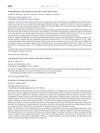 195 citations,
February 2007 in “The Journal of Clinical Endocrinology and Metabolism”
195 citations,
February 2007 in “The Journal of Clinical Endocrinology and Metabolism” Dutasteride and finasteride may reduce sperm count and volume but don't affect movement or shape; effects are reversible after stopping.
 September 2023 in “Clinical, Cosmetic and Investigational Dermatology”
September 2023 in “Clinical, Cosmetic and Investigational Dermatology” Higher SHBG levels are linked to less severe hair loss in women, but vitamin D levels don't seem to affect hair loss.
 April 2023 in “Clinical Chemistry and Laboratory Medicine”
April 2023 in “Clinical Chemistry and Laboratory Medicine” The document concludes that inflammation markers can be used in diabetes, vitamin D3 affects immune pathways, hyperthyroidism changes hormone levels, androgen levels help diagnose Adrenocortical Carcinoma, erectile dysfunction is linked to diabetes, hypogonadism is common in HIV-infected males, and hormones can be biomarkers for various conditions.
[object Object]  7 citations,
October 2017 in “The Prostate”
7 citations,
October 2017 in “The Prostate” Baldness in men with prostate cancer is linked to higher levels of certain sex hormones, but chest hair density is not.
 25 citations,
January 2013 in “International Journal of Trichology”
25 citations,
January 2013 in “International Journal of Trichology” Premature balding in some men may be linked to altered hormones, but it's not the male equivalent to polycystic ovary syndrome or metabolic syndrome.
 March 2017 in “Iraqi Journal of Pharmaceutical Sciences”
March 2017 in “Iraqi Journal of Pharmaceutical Sciences” Abuse of anabolic steroids in Iraqi athletes leads to negative effects on hormones, liver and kidney function, blood sugar, and cholesterol levels.
 30 citations,
January 2008 in “The Aging Male”
30 citations,
January 2008 in “The Aging Male” The study found no link between baldness patterns and androgen levels in men with benign prostate enlargement or prostate cancer.
 49 citations,
May 2018 in “Endocrine”
49 citations,
May 2018 in “Endocrine” Women with regular menstrual cycles and PCOS have linked kisspeptin and LH hormone patterns, unlike those with irregular cycles.
 34 citations,
December 2012 in “Current Opinion in Clinical Nutrition and Metabolic Care”
34 citations,
December 2012 in “Current Opinion in Clinical Nutrition and Metabolic Care” Sex hormone treatments can increase muscle mass in older adults but have inconsistent effects on muscle function and may carry cardiovascular risks.
 72 citations,
April 2008 in “The Journal of urology/The journal of urology”
72 citations,
April 2008 in “The Journal of urology/The journal of urology” Dutasteride and finasteride do not significantly affect bone density, blood fats, or blood production, but slightly lower PSA levels and minimally impact sexual function in healthy young men.
 5 citations,
August 2018 in “Sexual Medicine Reviews”
5 citations,
August 2018 in “Sexual Medicine Reviews” 5α-Reductase inhibitors do not consistently increase testosterone levels in the blood.
 28 citations,
January 2003 in “Urologic oncology”
28 citations,
January 2003 in “Urologic oncology” Suppressing certain hormones might help prevent prostate cancer.
 21 citations,
January 1991 in “Dermatology”
21 citations,
January 1991 in “Dermatology” Men with male pattern hair loss have different levels of certain hormones compared to men without hair loss.
 10 citations,
February 2020 in “Endocrine”
10 citations,
February 2020 in “Endocrine” Finasteride safely treats hair loss without harming hormones or reproduction, but may slightly reduce sexual function.
 104 citations,
October 1999 in “The Journal of Urology”
104 citations,
October 1999 in “The Journal of Urology” Finasteride doesn't harm male fertility or sperm quality, but may slightly reduce ejaculate volume.
 22 citations,
January 2006 in “International Journal of Andrology”
22 citations,
January 2006 in “International Journal of Andrology” Taking oral testosterone with finasteride or dutasteride doubles testosterone levels, and food slightly affects it.
 2 citations,
March 2017 in “Canadian Urological Association journal”
2 citations,
March 2017 in “Canadian Urological Association journal” Clomiphene citrate improves fertility in men taking finasteride for hair loss.
 1 citations,
July 2023 in “F&S Reviews”
1 citations,
July 2023 in “F&S Reviews” Some common medications may harm male fertility by affecting hormones, sperm production, and sexual function.
 4 citations,
January 2013 in “PubMed”
4 citations,
January 2013 in “PubMed” Testosterone and finasteride raise insulin and zinc, lower chromium in male rats.
[object Object]  77 citations,
May 2012 in “Expert Opinion on Emerging Drugs”
77 citations,
May 2012 in “Expert Opinion on Emerging Drugs” New treatments for male hypogonadism are effective and should be personalized.
 45 citations,
January 2008 in “Drugs”
45 citations,
January 2008 in “Drugs” Dutasteride effectively treats enlarged prostate, reduces prostate cancer risk, and promotes hair regrowth with few side effects.
 11 citations,
December 2010 in “The Journal of Urology”
11 citations,
December 2010 in “The Journal of Urology” Taking oral testosterone with or without dutasteride increases testosterone levels and could be an effective treatment for low testosterone.
 10 citations,
October 2010 in “International Journal of Andrology”
10 citations,
October 2010 in “International Journal of Andrology” Finasteride doesn't affect oral testosterone undecanoate, and high DHT levels may cause acne, prostate issues, and hair loss.
 6 citations,
November 2010 in “International Journal of Andrology”
6 citations,
November 2010 in “International Journal of Andrology” New oral testosterone formulations show potential for safer, effective hormone replacement in men with low testosterone.
 1 citations,
December 2006 in “Burns”
1 citations,
December 2006 in “Burns” New therapies for burn wounds show promise in reducing pain, infection risk, and improving healing and physical outcomes.
 147 citations,
April 1990 in “The Journal of Clinical Endocrinology and Metabolism”
147 citations,
April 1990 in “The Journal of Clinical Endocrinology and Metabolism” Finasteride safely lowers DHT levels without affecting testosterone.
 8 citations,
January 2017 in “Fertility and Sterility”
8 citations,
January 2017 in “Fertility and Sterility” Urologic diseases and treatments in older men can negatively affect fertility, and doctors should talk to patients about this.
 1 citations,
May 2011 in “Journal of Human Reproductive Sciences”
1 citations,
May 2011 in “Journal of Human Reproductive Sciences” Finasteride may decrease semen quality but not harm sperm production, and stopping the drug can improve semen quality; hyperprolactinemia can cause infertility but is treatable with medication.
 4 citations,
June 2017 in “Endocrine Reviews”
4 citations,
June 2017 in “Endocrine Reviews” Dihydrotestosterone (DHT) mainly affects nearby cells, doesn't significantly change prostate hormonal environment or cancer risk, and doesn't play a main role in causing hair loss or acne. More research is needed on its effects on heart health, sexual function, and bone health.
10 citations,
October 2012 in “Andrology” Prostate cancer can progress even with low testosterone due to internal hormone production in the tumor.




























